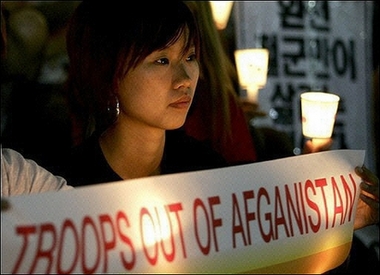Afghan leaders: Free female hostages
(Agencies)Updated: 2007-07-30 08:54
Kabul - Afghanistan's top political and religious leaders invoked Afghan and Islamic traditions of chivalry and hospitality Sunday in attempts to shame the Taliban into releasing 18 female South Korean captives.
 A South Korean woman attends a candlelight vigil in Seoul, demanding the withdrawal of South Korean troops from Afghanistan and the safe return of their kidnapped compatriots. [AFP]  |
A purported Taliban spokesman shrugged off the demands and instead set a new deadline for the hostages' lives, saying the hardline militants could kill one or all of the 22 captives if the government didn't release 23 militant prisoners by 3:30 am EDT Monday. Several other deadlines have passed without killings.
Afghan officials, meanwhile, reported no progress in talks with tribal elders to secure hostages' freedom.
In his first comments since 23 Koreans were abducted on July 19, Karzai criticized the Taliban's kidnapping of "foreign guests," especially women, as contrary to the tenets of Islam and national traditions.
"The perpetration of this heinous act on our soil is in total contempt of our Islamic and Afghan values," Karzai told a South Korean envoy during a meeting at the presidential palace, according to a statement from his office.
Echoing Karzai's words, Afghanistan's national council of clerics said the Prophet Muhammad, the founder of Islam, taught that no one has the right to kill women.
"Even in the history of Afghanistan, in all its combat and fighting, Afghans respected women, children and elders," the council said. "The killing of women is against Islam, against the Afghan culture, and they shouldn't do it."
And a former Taliban commander and current lawmaker who has joined the negotiations, Abdul Salaam Rocketi, said the government policy was that the "women should be released first."
But the Taliban spokesman, Qari Yousef Ahmadi, instead invoked the religious tenet of "an eye for an eye," alleging that Western militaries are holding Afghan females at bases in Bagram and Kandahar, and saying that the Taliban can do the same. He said the Taliban could detain and kill "women, men or children."
"It might be a man or a woman. ... We may kill one, we may kill two, we may kill one of each (gender), two of each, four of each," Ahmadi told The Associated Press by satellite phone from an unknown location. "Or we may kill all of them at once."
Ahmadi said the militant group had given a list of 23 insurgent prisoners it wants released to government officials, and that if they weren't freed by midday Monday hostages would be killed.
The Taliban has set several deadlines that passed without consequence and it wasn't clear how seriously the militants would treat their latest ultimatum. A leader of the South Korean group was shot and killed Wednesday but it was unclear why.
Two days of meetings between elders of Qarabagh district in Ghazni province, where the South Korean hostages were kidnapped on the Kabul-Kandahar highway, and a delegation of senior officials from Kabul yielded no results so far, said Shirin Mangal, spokesman for the Ghazni provincial governor.
The meeting is being held behind closed doors, and Mangal did not divulge any details.
In his meeting with Karzai, Korean presidential envoy Baek Jong-chun thanked the president for the Afghan government's help with the hostage situation and said South Korea will respect the Afghan government's way of ending the crisis, according to Karzai's office.
Pope Benedict XVI also called for the hostages' release, saying the perpetrators "desist from the evil they have carried out and give back their victims unharmed."
|
|
|
||
|
||
|
|